- Home
- Jack Campbell
Swords and Saddles Page 4
Swords and Saddles Read online
Page 4
“No. I’m not okay.” Ariana clenched her eyes shut in anger. “Why? I know what’s happened, but I don’t know why. It’s my job to try to understand the way others think. Is it too much to ask that I be allowed to understand why my husband died and why I’m going to die and why those children have to die?”
Johansen ran one hand down his weapon, concentrating on the curves and edges of it under his palm. “People always die sooner or later. Why do any of us have to die?”
“I’m not talking about philosophy.”
“Neither am I.” Johansen gave her a rueful smile. “I’ve seen a lot of people die. Most of the time, I couldn’t tell you why they died. Especially I couldn’t tell you why they died and not me.”
She returned a curious look. “Most of the time? Meaning sometimes you could tell why they died?”
“Sure. Sometimes they died because I shot them.”
After a long moment, Ariana spoke slowly. “That was a joke?”
“Yeah,” Johansen said. “Soldier humor. Some of it’s pretty dark, but you either joke about it or let it give you nightmares. Sometimes both.”
“Greeting death with a smile?”
“Yeah. It’s nuts, but it keeps us going.”
She studied him, shaking her head. “You see, I never understood that greeting death with a smile phrase. What did it mean? None of the other humans here I talked to could understand it, either. They blew it off as some kind of symbolism. I thought it must be an Izkop way of thinking, embracing death under certain circumstances. But you showed it. You and the others, and none of you want to die. Now, I think maybe I understand a little. It’s not about welcoming death, it’s more about laughing at death to push fear aside.”
“Yeah, I guess that’s right. No soldiers here, huh?”
“No. We’re all researchers.” Ariana looked down. “What Scorse said, about soldiers being…”
“Low class creatures with limited intellect?” Johansen asked, grinning at her reaction. “That’s something Sergeant Singh calls us sometimes. But only when he’s unhappy with us. One of the things you learn as a soldier, though, is that everybody’s got some experience, some way of thinking that might be useful. Most people, anyway. I’ve met a few who couldn’t walk and chew gum at the same time, but only a few. You need all kinds. I’ve been around enough to know that everything can’t be solved with firepower. Right now, I guess that’s all we’ve got, but I wouldn’t mind some other options. At least there’s something we can do. I don’t know what it’s like for you and the other civilians.”
“We’re not used to any of this,” Ariana said. “The danger. Taking care of the children. Scorse isn’t helping at all with that, and even though Juni’s okay with children I can tell he resents acting as a baby-sitter.”
“Well, yeah, big shot research guy, huh? I mean, he seems okay, but that’s the sort of job he figures he’s supposed to pay other people to do. You said none of the kids here are yours?”
Ariana shuddered again. “No.”
“That’s one good thing, then.”
“Yes.” She stared at Johansen. “Having children at Amity was a demonstration that we were here in peace. We kept the numbers limited so it didn’t appear we were settling here. It was all supposed to show that this was peaceful and not aggressive.”
Johansen made a noncommittal gesture. “I guess the Izkop didn’t see it that way.”
“Or it somehow didn’t matter to them even if they did see what we intended.” Ariana clenched her fists and her jaw, the muscles standing out clearly even in the darkness. “We all thought that we understood them well enough to know if anything was wrong, and I still have no idea why they massacred everyone at Amity. Or what the mutilation after death means. One thing I do know is that the Izkop consider children to be purer of spirit than adults. It may not be a coincidence that the Izkop moved against Amity when the children left to come here for a few days, but why that would matter if they intend killing us here as well is one more thing I don’t understand.”
After a long silence, Johansen cleared his throat softly. “I dated a woman for quite a while once. Moved in with each other and all that. I thought everything was fine, that we understood each other, and then one day she left. Said she’d been telling me what was bothering her, and when I didn’t respond it just made her more upset.”
Ariana met his eyes. “But you hadn’t noticed anything?”
“Nope.” Johansen looked out at the darkness, not wanting to see the fear and sorrow in her. Instead his mind conjured up a vision of Maria standing at the door to their place, her face twisted with anger, yelling at him. How could you not know? I kept telling you! A door slammed and Johansen started with pulse pounding and weapon coming up before he realized that sound had only echoed in his memory. “We think we can understand aliens when we can’t even communicate with other humans half the time.”
“I suppose that’s true.” Ariana bit her lip. “It’s our job to understand, though, just as it’s your job to fight. How could the Izkop have killed so many soldiers? Your sergeant explained, but none of us really understood.”
He didn’t want to recall that, but the question deserved an answer. “Um, well, when you fight, you need someone watching your sides and your back, right? Usually, that someone can be a good distance off, but against a whole mob you need them right there, otherwise while you’re shooting forward some others can get behind you and grab your arms and stuff.” Johansen shrugged, hoping the hammering of his heart at the memories of the massacre wasn’t too obvious to her. “Like Sergeant Singh said, the battalion was scattered all over the valley.”
“But why were you scattered? Didn’t your leaders, your commanders, know that you needed to watch each other’s backs?”
“Well…there was talk the captain, our company commander, that is, was unhappy with the plan, but the colonel, he was in charge of the whole operation, was set on dropping in a wide formation,” Johansen explained. “Because it was a rescue op. We could see Izkop on the hills around the valley, in lots and lots of small groups. The colonel wanted us to cover lots of territory so we’d be wherever the civilians were in the valley. If we just dropped in a tight group then some or even all the civs might be outside the group and then the Izkop could rush in and massacre them.” It seemed funny now, in a sick way. “We didn’t know the Izkop already had massacred the civs at Amity, and hidden themselves all over the valley. So we got massacred, too.
“We knew they were in the hills but didn’t see them waiting in the valley itself. Maybe your people showed them how IR gear and stuff like that works. They figured out how to hide from it, and our leaders didn’t figure they’d do that. Just a bunch of spear-chucking primitives, right? There they are, no need to look around any more, no need to deploy special battlefield recce, especially when those civs need us now! So we dropped right in as if the whole landing zone was empty. Only it wasn’t. Someone wants to kill you that bad, usually there’s a real strong reason. I guess I’d like to know what the reason is, too.”
“They destroyed everything in Amity, you told us,” she said. “That has to be a clue. Have I mentioned Prometheus?”
“Prometheus? The Titan who stole fire from the gods?”
“You know about that Prometheus?” She smiled, then looked embarrassed. “I’m sorry. I –“
“No offense taken, ma’am.”
“My students call me Professor Tisrok. My friends call me Ariana. No one calls me ma’am.”
He couldn’t help grinning at her. “So what am I?”
“Call me Ariana. The Izkop legends have a figure I call Prometheus. But the status of the Izkop Prometheus is confusing to me. Is he a god? Or a demon? He seems to be both. The Izkop value knowledge, but also fear having their souls corrupted by accepting things stolen from the gods.”
“You think maybe the Izkop decided humans were working with Prometheus?” Johansen asked.
“Maybe,” she said cautiously. “But o
ur policies should have prevented the Izkop from ever thinking that. We never gave them anything. What happened that translated into massacre? What did the Izkop think happened? If only…“
“Yeah?”
Ariana clenched her jaw again. “My professional opinions aren’t popular. There’s a lot of politics in academia. I believe that mythologies, religious beliefs, tell you a lot about how sentient creatures think. That’s not fashionable right now. The orthodox, prevailing view in my field is that myths and religions are just window-dressing, not really fundamental to world-views and not regarded by cultures as serious explanations for how the universe works.”
Johansen gave her a baffled look. “Where did anyone get that idea?”
“If everyone you work with and socialize with thinks like that, then it’s very easy to believe that it’s true of everyone else.” Ariana sighed. “Like Juni, most of my colleagues back at Amity even argued that the Izkop aren’t truly warlike, that the spears and the battle practices and everything else are just vestigial and symbolic. They look at a primitive society and see the noble savage.”
“Noble savage?” Johansen shook his head, his eyes searching the darkness outside. “How does someone be noble and savage? And how does that correlate with being primitive?”
She laughed briefly, the sound filled with pain. “Those are exactly the sort of questions that I ask. Some very technological human societies have been very savage. Noble primitives seem to be something people want to believe in, like…like…”
“Hookers with hearts of gold?”
“Yes! Those are probably as rare in real life as noble savages.”
“So,” Johansen asked, “what do noble savages do?”
Ariana sighed, shaking her head. “I’ve been told by experts senior to me that the Izkop with their primitive technology are so closely connected to their world that they understand their place in the universe much better than we do.”
“How exactly does that work?” Johansen asked after a long moment.
She caught the hint of mockery in his voice. “That’s a question that Juni would answer with many words made up of many syllables. I don’t believe the logic behind them. That’s why I was posted out here, where I wouldn’t bother others any more with my skepticism. Now perhaps I’ve been proven right, and those experts are now dead in Amity, and it hurts so bad. If only I’d been wrong.” Her voice broke on the last words.
“You being wrong wouldn’t have meant they were right.”
She gave him a tormented look. “Perhaps there’s something more I could have done. Something that could have saved everyone.”
He watched the night outside for a moment being replying, glad that her presence had driven off the ghosts. “Nobody can save everybody. It’s not your fault.” He’d been told that, years ago. He hadn’t believed it. Not really. He wondered if she would.
Ariana inhaled deeply, then fell silent, so they just sat there for a long time until she dozed off and Adowa came to relieve him on the watch. Adowa raised a questioning eyebrow at Johansen as she pointed at Ariana, but he just shook his head and gestured for quiet.
#
When dawn came, there were no Izkop visible. Johansen felt hope stir.
The morning dragged on with nothing moving outside except the wandering path of the cow and an occasional sighting of a wild creature in the grass or the sky. Archer nursed her comm unit but heard nothing. They checked and rechecked the barricades at the doors and larger windows. Singh moved from soldier to soldier, giving advice and calming talks, but no one said much, as if afraid too much conversation would draw the Izkop out.
Juni had been pacing back and forth most of the morning, and now peered out the window toward the cow, which mooed piteously. “I should go out. I’ll get the milk, and come back. The Izkop aren’t doing anything today.”
Singh shook his head. “No, sir. Please stay inside.”
“But it’s safe. It’s almost noon and -”
Ariana suddenly gasped. “Noon. ‘The banner of the sun flaming its highest.’ Sergeant, one Izkop myth says that’s when heroes die.”
“And they might think we’re heroes? Everybody to the windows!” Singh barked at the soldiers. “Ma’am, you and the others get in with the kids. Call us if there’s any sign the Izkop are trying to get in through the back.”
Ariana ran toward the rear of the building, grabbing Juni as she went, but Scorse fended her off. “I’ll stay out here,” he growled.
Johansen took a long slow breath, his rifle resting on the sill of the window. Behind him, the door to the back room shut. Outside, a flying creature spiraled into the air from the surface of the meadow. “Something scared it,” Goldera said. “They’re out there.”
Shouts echoed between the bluffs. The Izkop seemed to rise out of the ground a kilometer away and came forward at a steady pace, staying shoulder to shoulder as they moved. “Hold fire until I give the command!” Singh called, also kneeling at a window. “Make every shot count!”
“Hell, Sarge,” Goldera commented, “with them lined up like that even Archer couldn’t miss.”
“Shut up,” Archer snapped back at him, sounding for a moment more annoyed than scared.
As the Izkop drew closer, Johansen found himself focusing on small things. The way their hips worked as they moved, not quite like a human’s would. The bright gleam of the short stabbing spears every Izkop carried. The faces which seemed curiously impassive to human eyes. The tough vegetation being crushed beneath the serried ranks of Izkop.
“Fire!”
Johansen aimed and fired as fast as he could, the solid oncoming block of Izkop an impossible-to-miss target. To his right he heard the thunderous whirr of the buzz-saw pumping out rounds, Nassar walking the stream of bullets across the formation to drop Izkop like a scythe felling reeds in long lines.
The Izkop came inside the fence, rushing toward the building, while the soldiers fired, reloaded and fired again. The entire compound seemed to be packed with Izkop, a seething mass which lapped against the building like a flood, then abruptly pulled back, retreating to the fence and continuing their withdrawal.
“Cease fire!” Another shot rang out and Singh glowered at Burgos. “Cease fire, dammit!”
“Oh, man.” Goldera stared at the mounds of dead Izkop outside. “They’re crazy. They just kept coming. We are so dead.”
“They’ll be back,” Singh agreed, “but we’re not dead yet.”
A wild mooo echoed through the sky, followed by the appearance of the cow trotting quickly across the yard, her panic-stricken eyes huge and rolling as she dodged the piles of dead.
The soldiers simply watched it wordlessly for a long moment before Archer said something in a wondering voice. “They didn’t kill the cow?”
Another long silence, then Stein spoke with great deliberation. “Maybe they like cows.”
Archer grinned, too wide and too stressed for the gesture to represent real humor. “Next time they hit us, I’m going to be behind that cow.”
“No. I mean it. Maybe they’re like the Sarge’s people.”
Singh bent a severe look on Stein. “I’m a Sikh, not a Hindu.”
“Oh. Right.”
“Anybody hurt? No? Ammo inventory,” Singh ordered.
Nassar waved toward the discarded buzz-saw. “I’ve got sixty-five rifle rounds left, but the machine gun’s out. Now it’s only good for hitting them over the head with.”
“We’ll probably need it for that,” Adowa said. “Thirty-two rifle rounds remaining, Sarge, plus twenty for my pistol.”
“I got forty,” Archer reported. “Uh, no pistol,” she added unnecessarily since as the comm carrier she didn’t also lug a side arm.
“Thirty-one,” Stein said in an apologetic voice. “And one clip for the pistol. That’s twenty, right?”
“You taking time to aim again, Stein?” Goldera joked in a strained voice. “I got twenty-nine for the rifle. No pistol.”
“Wha
t happened to your side arm?” Johansen demanded.
“I dunno. When we got clear of the drop ship it wasn’t there. I didn’t think I should go back looking for it.”
“Eleven rounds rifle, twenty pistol,” Burgos said, then looked away when Singh glared at her again.
“We need to exercise fire discipline,” the sergeant said coldly. “Corporal?”
“Twenty-four and twenty for the pistol,” Johansen said.
Singh looked out the window, his eyes calculating. “We might be able to fight off another attack before the ammo is gone. Maybe not. Then it’ll be hand-to-hand.”
“They got a lot more hands than we do,” Adowa said. “Any chance we can get some of those spears off the bodies out there? Those have more reach than our combat knives.”
‘It wouldn’t hurt.” Singh turned his gaze back on them. “Not at night. It’d give us cover, but it’d give the Izkop a lot more. Any volunteers to go out there now?”
Johansen blew out a tired breath into the silence. “I’ll go.”
“Me, too,” Goldera hastened to add. The others removed the barricade at the front door enough for the two to slip out, then Johansen and Goldera scuttled toward some of the dead Izkop, staying low.
Johansen grabbed some of the spears, watching carefully in case any of the Izkop were playing possum and still able to stab. He passed the spears to Goldera, who kept one eye on the fields beyond the compound. “Hey, corporal,” Goldera whispered.
“Yeah?”
“You scared?”
“Damn right.”
“Me, too,” Goldera confessed. “If you get out of this and I don’t, write my mama and tell her I did okay even though I was scared. Will you do that?”
“Sure.” He picked up a final two spears. “That’s two apiece for all of us. Let’s get back inside.”
“You got anybody you want me to tell anything if you don’t make it?” Goldera asked Johansen.
Johansen didn’t have to think about it. “Nah. Not anymore.” Then they were squeezing inside and the door being sealed again in their wake.
Singh had them all try out the spears, which Johansen found to be well-balanced for stabbing though far too front-heavy for throwing. Then everyone settled down again, the civilian adults once again all in the front room. “It’s hard being in there with the kids,” Juni complained. “They keep asking what’s happening, when they’re going home, can they talk to their parents. We told them to play and stay quiet.”

 Ascendant
Ascendant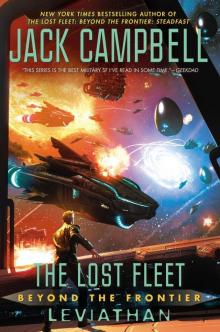 Leviathan
Leviathan Fearless
Fearless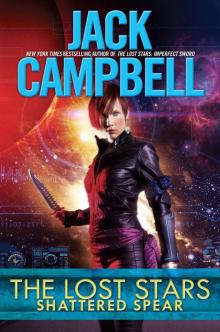 Shattered Spear
Shattered Spear The Pirates of Pacta Servanda
The Pirates of Pacta Servanda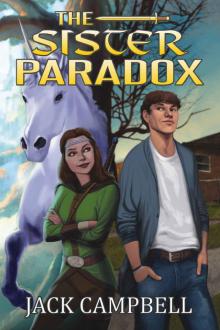 The Sister Paradox
The Sister Paradox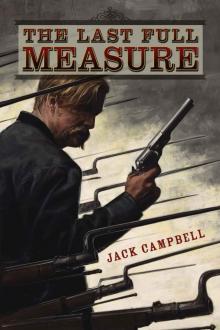 The Last Full Measure
The Last Full Measure The Dragons of Dorcastle
The Dragons of Dorcastle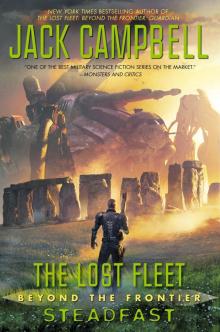 Dreadnaught
Dreadnaught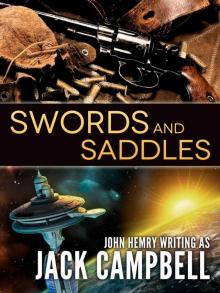 Swords and Saddles
Swords and Saddles The Hidden Masters of Marandur
The Hidden Masters of Marandur Relentless
Relentless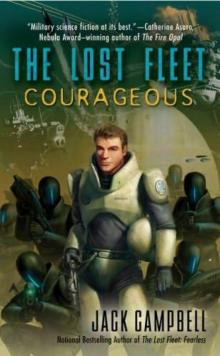 Courageous
Courageous Ad Astra
Ad Astra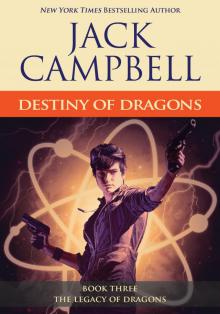 Destiny of Dragons
Destiny of Dragons Borrowed Time
Borrowed Time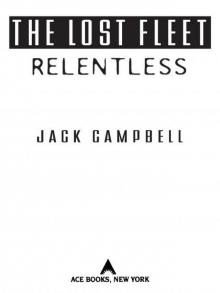 Dauntless
Dauntless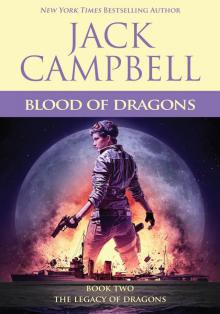 Blood of Dragons
Blood of Dragons Perilous Shield
Perilous Shield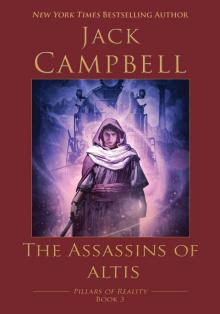 The Assassins of Altis
The Assassins of Altis Vanguard
Vanguard Pirate of the Prophecy
Pirate of the Prophecy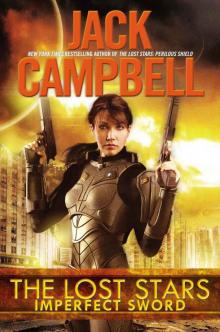 Imperfect Sword
Imperfect Sword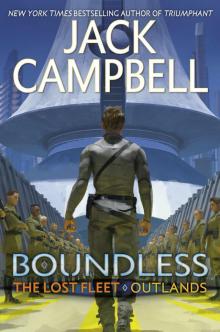 Boundless
Boundless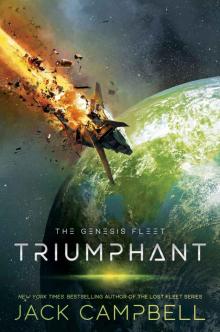 Triumphant
Triumphant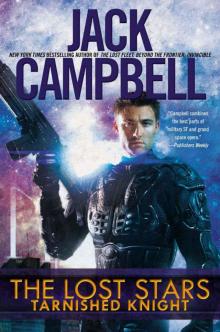 Tarnished Knight
Tarnished Knight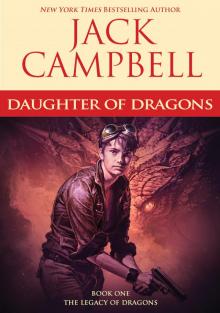 Daughter of Dragons
Daughter of Dragons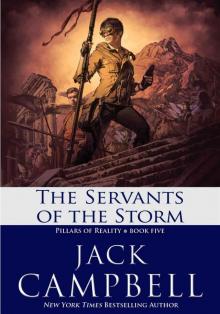 The Servants of the Storm
The Servants of the Storm Steadfast
Steadfast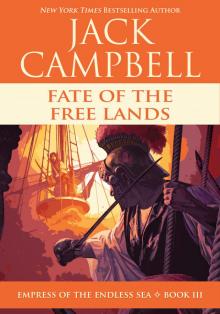 Fate of the Free Lands
Fate of the Free Lands Explorer of the Endless Sea
Explorer of the Endless Sea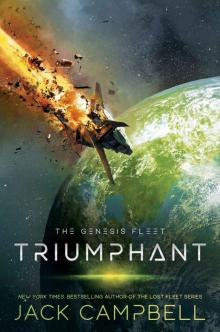 Triumphant (Genesis Fleet, The)
Triumphant (Genesis Fleet, The)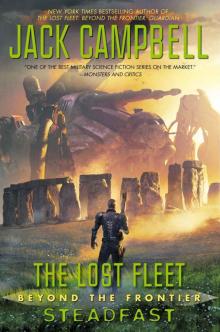 The Lost Fleet: Beyond the Frontier: Steadfast
The Lost Fleet: Beyond the Frontier: Steadfast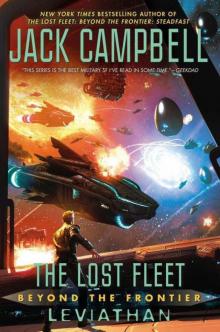 The Lost Fleet: Beyond the Frontier: Leviathan
The Lost Fleet: Beyond the Frontier: Leviathan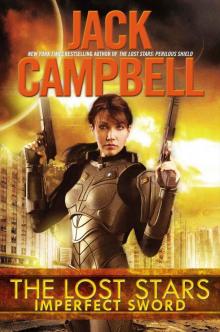 The Lost Stars: Imperfect Sword
The Lost Stars: Imperfect Sword Dreadnaught tlfbtf-1
Dreadnaught tlfbtf-1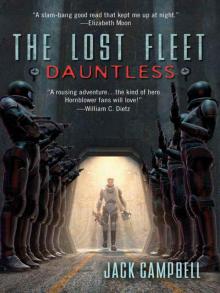 The Lost Fleet: Dauntless
The Lost Fleet: Dauntless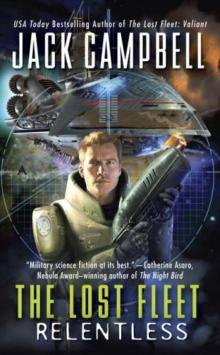 Relentless tlf-5
Relentless tlf-5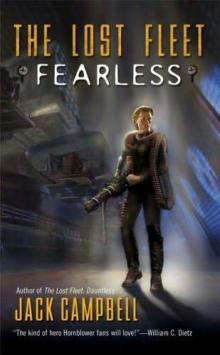 Lost Fleet 2 - Fearless
Lost Fleet 2 - Fearless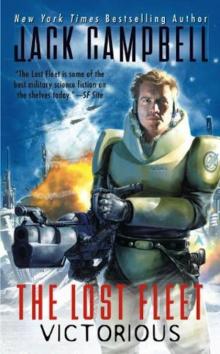 Victorious tlf-6
Victorious tlf-6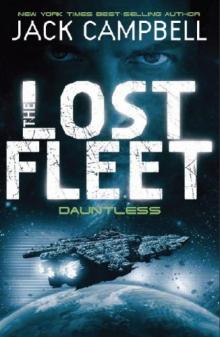 Dauntless tlf-1
Dauntless tlf-1 The Pirates of Pacta Servanda (Pillars of Reality Book 4)
The Pirates of Pacta Servanda (Pillars of Reality Book 4)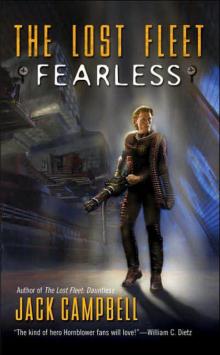 Fearless tlf-2
Fearless tlf-2 The Lost Stars: Perilous Shield tls-2
The Lost Stars: Perilous Shield tls-2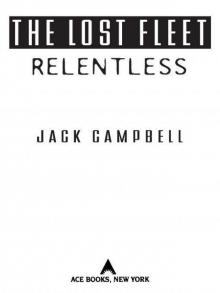 Lost Fleet 5 - Relentless
Lost Fleet 5 - Relentless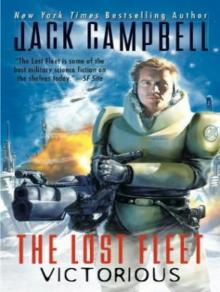 Lost Fleet 6 - Victorious
Lost Fleet 6 - Victorious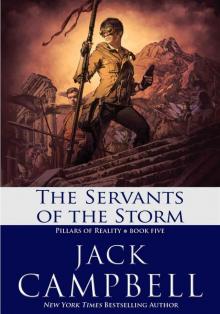 Pillars of Reality 5- The Servants of the Storm
Pillars of Reality 5- The Servants of the Storm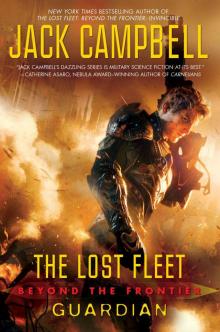 The Lost Fleet: Beyond the Frontier: Guardian
The Lost Fleet: Beyond the Frontier: Guardian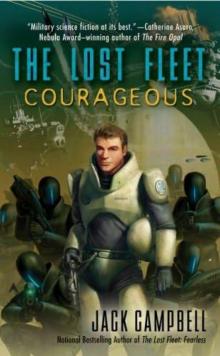 Lost Fleet 3 -Courageous
Lost Fleet 3 -Courageous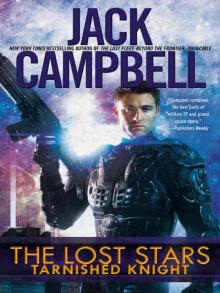 The Lost Stars: Tarnished Knight
The Lost Stars: Tarnished Knight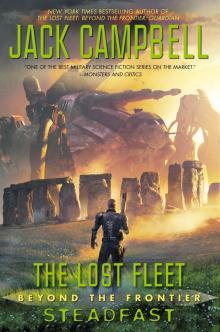 Beyond the Frontier: Steadfast
Beyond the Frontier: Steadfast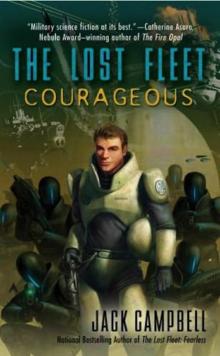 Courageous tlf-3
Courageous tlf-3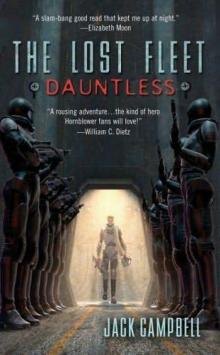 Lost Fleet 1 - Dauntless
Lost Fleet 1 - Dauntless The Lost Stars
The Lost Stars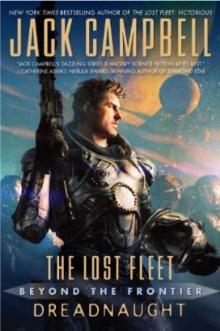 The Lost Fleet: Beyond the Frontier: Dreadnaught
The Lost Fleet: Beyond the Frontier: Dreadnaught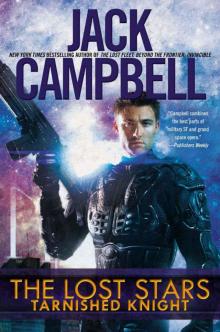 The Lost Stars 01-Tarnished Knight
The Lost Stars 01-Tarnished Knight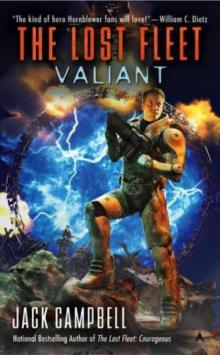 Valiant tlf-4
Valiant tlf-4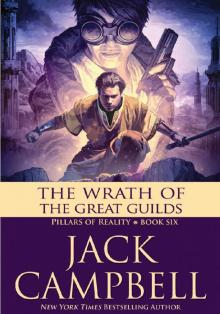 The Wrath of the Great Guilds (The Pillars of Reality Book 6)
The Wrath of the Great Guilds (The Pillars of Reality Book 6)